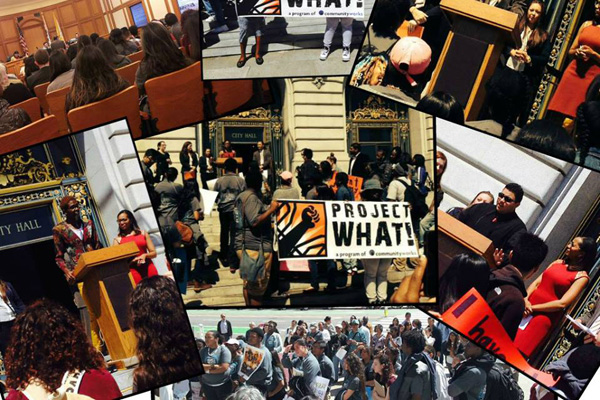Project WHAT!, a program of Community Works West, raises awareness about children with incarcerated parents with the long-term goal of improving services and policies that affect these children. Project WHAT! employs young people who have experienced parental incarceration and supports them in developing curriculum content, facilitating trainings, making public presentations, and conducting qualitative research. Since its inception in 2006, Project WHAT! has hired and supported more than 120 youth with incarcerated parents.
Collectively, these youth have trained more than 8,000 individuals including judges, educators, legislators and other policy makers, youth, undergraduate and graduate students, social workers, community health workers, court appointed special advocates, incarcerated parents, caregivers, criminal justice and law enforcement professionals, lawyers, and court investigators. These youth-led trainings combine research-backed instruction with the emotional impact of firsthand testimony.
There are an estimated 2.4 million children nationwide who have had a parent incarcerated in prison or jail, 18,000 of whom live in San Francisco (and many more with a parent under criminal justice supervision – either on parole or probation). Project WHAT! is the only program in the country that is led exclusively by those affected by parental incarceration, whose mandate is to amplify the voices of youth with similar backgrounds in ways that change policy, practice, and individual lives.
Project WHAT! is one of many initiatives and projects developed out of the San Francisco Children of Incarcerated Parents Partnership (SFCIPP). Established in 2000 in part by the Zellerbach Family Foundation, SFCIPP is a coalition of social service providers, government agencies, advocates and others which informs the development of policies and practices to improve the lives of these children.
Participating youth testify on the impact of Project WHAT!
My reason for participating in Project WHAT! is that it brings out the fighter in me, and I can actually see the progress that we as a team are making so that is what keeps me motivated and coming back. I get to see firsthand that I am making a difference. I love walking into city hall and knowing that my presence will have an impact.— Jessica, Peer Mentor, 19
I really enjoy being part of a huge successful movement, organization like Project WHAT! . Being part of Project WHAT! makes me feel alive and I feel like I am making a difference in youth and in society and it feels amazing. But I also feel at home and safe, like I can trust the family around me to be there for me through my father’s incarceration.— Daniel, Youth Advocate, 15
Through the time I’ve been in Project WHAT!, I love that I’ve gotten healing and learned how to cope with things easier. Project WHAT! has given me my voice and broke my 12 year silence since my father was incarcerated. One of the things I’ve learned in Project WHAT! is my speaking skills and professionalism. I’ve always been shy, unconfident. Project WHAT! has helped me improve not just for the program but for school as well.— Moni, Youth Advocate, 15
Project WHAT! resources:
- Project WHAT! developed a youth-written Resource Guide for teens with a parent in prison or jail, which has been distributed to more than 3,400 young people. This 80-page workbook answers common questions that children have when a parent is incarcerated, and it explains complex jail and prison visiting procedures in plain language.
- PW! Summer 2014 newsletter
- The Hidden Sentence is a training video focused on the mental health impacts of parental incarceration on youth in the foster care system
- Jazree’s Court and Vanessa’s 8 Year Sentence are award-winning films created by Brave New Films to encourage judges to consider alternatives to incarceration when parents face non-violent offenses
- The Tubman Center in Detroit, MI created this Fundraising Video as part of a campaign to replicate Project WHAT!


